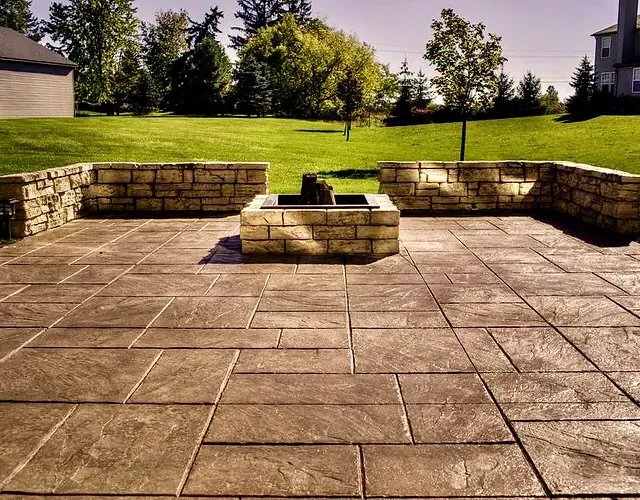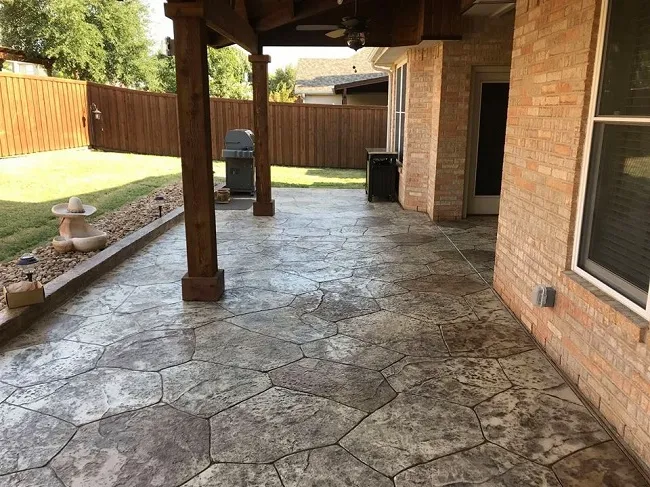Available Now
How to Fix Holes in a Concrete Driveway
How to Fix Holes in a Concrete Driveway

To fix holes in a concrete driveway, first, identify the hole type and its cause. Be safe with gear. Prepare, pick the right fix, and think about future care. You can do it yourself or get help if it's hard. Look at examples and use our extra info.
- Identify the Hole Type: Understand the nature of the hole in your concrete driveway for effective repair.
- Root Causes Matter: Weathering effects, tire pressure, tree roots, cleaning agents, and drainage impact hole formation.
- Safety First: Prioritize safety with protective gear during repairs.
- Proper Preparation: Thoroughly inspect your driveway and gather necessary tools and materials.
- Repair Techniques: Learn step-by-step processes for small cracks, pits, and deeper holes.
Concrete driveways are a sturdy and durable choice for any home, but over time, they can develop unsightly holes and cracks. These imperfections not only mar the appearance of your driveway but can also pose safety hazards. If you're considering a new installation or a replacement, understanding the
basics of concrete driveways can be beneficial. In this comprehensive guide, I'll walk you through the entire process of fixing holes in a concrete driveway, from understanding the problem to executing repairs and preventing future damage. For those who prefer professional assistance,
JM Ballarat Concreters offer expert services tailored to your needs. Whether you're a novice or a seasoned DIY enthusiast, this guide is tailored to ensure you can successfully restore your driveway to its former glory.
Introduction
Concrete driveways are a common feature of many homes, known for their durability and longevity. However, like any other part of your property, they require maintenance and occasional repairs. One of the most prevalent issues faced by homeowners is the formation of holes in their concrete driveways. These holes can range from small cracks and pits to more extensive, deep holes. In this guide, I'll explain the causes behind these driveway imperfections and take you through a step-by-step process on how to fix them. If you're dealing with a sunken driveway, our guide on
how to repair a sunken concrete driveway can be particularly helpful. Whether you're looking to enhance your home's aesthetics or ensure safety for your family and vehicles, addressing these holes is essential.
Understanding Concrete Driveway Holes
Types of Holes
| Types of Holes: | |
|---|---|
| Hole Type | Description |
| Small Cracks | Superficial, thin lines on the surface. |
| Pits | Small depressions caused by surface wear. |
| Deep Holes | Severe, impacting driveway integrity. |
Before diving into repairs, it's crucial to understand the types of holes you might encounter in your concrete driveway:
Small Cracks: These are often superficial and can resemble thin lines on the surface.
- Pits: Pits are small depressions in the concrete, usually caused by surface wear and tear.
- Deep Holes: Deep holes are more severe and can significantly impact the driveway's integrity and appearance.
Causes of Driveway Holes

To address the problem effectively, it's essential to identify the root causes of these holes:
- Weathering Effects: Concrete driveway holes can often be attributed to weathering effects that occur over time. Freezing and thawing cycles in cold climates can cause concrete to expand and contract, leading to the formation of cracks and holes.
- Tire Pressure Impact: The weight and tire pressure of vehicles that frequently use the driveway can exacerbate hole formation. Overinflated or underinflated tires can exert uneven pressure on the concrete, accelerating wear and tear.
- Tree Roots: Surprisingly, nearby trees and their root systems can contribute to driveway holes. Tree roots seek moisture, and if they infiltrate the soil under the driveway, they can cause the concrete to shift and crack, leading to hole formation.
- Cleaning Agents: Some cleaning agents used on driveways, such as certain types of chemical cleaners, can gradually erode the surface of the concrete. This erosion can weaken the concrete, making it more susceptible to hole development.
- Drainage Issues: Poor drainage around the driveway can also play a role in hole formation. Water pooling or improper runoff can gradually erode the ground underneath the concrete, leading to sinking and the creation of voids that become holes over time.
| Causes of Holes: | |
|---|---|
| Causes | Description |
| Weathering Effects | Expansion and contraction due to weather changes. |
| Tire Pressure Impact | Uneven pressure from vehicle tires. |
| Tree Roots | Roots infiltrating and shifting the concrete. |
| Cleaning Agents | Chemicals that erode the concrete surface. |
| Drainage Issues | Poor water runoff leading to soil erosion. |
Assessment and Preparation
Inspecting the Driveway
Begin by inspecting your driveway to assess the extent of the damage:
- Walk the Length: Take a slow walk along the entire length of your driveway, paying close attention to any visible holes, cracks, or pits.
- Note the Severity: Make a note of the size and depth of each hole. This will help you plan the necessary repairs effectively.
Safety Precautions and Tools
Safety should always be a top priority when working with concrete. Here are some essential safety precautions and tools you'll need:
- Safety Gear: Wear safety goggles, gloves, and a dust mask to protect yourself from concrete dust.
- Concrete Mix: Choose a high-quality concrete mix suitable for your climate.
- Bucket and Mixing Tools: You'll need a sturdy bucket and a mixing tool like a hoe or a shovel.
- Trowel: A trowel is essential for spreading and smoothing the concrete.
- Water Source: Have access to water nearby for mixing the concrete and cleaning your tools.
- Bonding Agent: If needed, use a bonding agent for a stronger bond between old and new concrete.
Repairing Small Cracks and Pits

Step-by-step Guide
For minor cracks and shallow pits, follow these steps:
- Clean the Holes: Use a wire brush and a hose to clean out any debris or loose material from the holes.
- Apply Bonding Agent: If you're using a bonding agent, apply it to the holes according to the manufacturer's instructions.
- Mix the Concrete: In your bucket, mix the concrete following the package instructions. It should have a thick but workable consistency.
Filling Deep Holes
In-depth Instructions
For deeper holes or larger cracks in the concrete, a different approach is required:
- Moisten the Holes: Before applying the concrete mix, moisten the holes with water. This helps the new concrete bond better with the old.
- Fill the Holes: Use your trowel to fill the holes with the concrete mix. Make sure to pack it in tightly and level it with the surface of the driveway.
- Smooth and Finish: Once the holes are filled, smooth the surface with your trowel to ensure a seamless finish. Feather the edges to blend with the surrounding concrete.
Remember, patience is key in achieving a professional-looking repair. Take your time to ensure the best results.
Choosing the Right Products
Overview of Concrete Patching Compounds
Choosing the right products for your driveway repair is crucial. Here's an overview of common concrete patching compounds and fillers:
- Concrete Patch: This is a versatile option suitable for various repairs, from small cracks to deeper holes.
- Vinyl Concrete Patch: This compound contains vinyl resin, making it flexible and less prone to cracking.
- Epoxy Concrete Patch: Epoxy is incredibly durable and resistant to moisture, making it ideal for deep holes.
- Polyurethane Concrete Patch: Polyurethane offers excellent flexibility and is resistant to UV rays, making it suitable for outdoor use.
Consider the nature and severity of the damage when selecting the most suitable product for your repair.
Repairing Techniques
Surface Cleaning
Before starting any repairs, thorough surface cleaning is essential:
- Remove Debris: Use a broom or leaf blower to clear the driveway of loose dirt and debris.
- Pressure Washing: For a deeper clean, consider using a pressure washer to remove stubborn stains and dirt.
Wetting the Surface
Before applying any concrete mix, wetting the surface helps in achieving a better bond between the old and new concrete:
- Moisten the Area: Spray the entire repair area with water just before applying the concrete mix.
Protective Gear
Safety should always come first:
- Safety Gear: Ensure you wear safety goggles, gloves, and a dust mask to protect yourself from potential hazards.
Mixing and Applying Compounds
Proper mixing and application of the compounds are critical for long-lasting repairs:
- Follow Instructions: Always follow the manufacturer's instructions for mixing and applying the chosen concrete patching compound.
- Trowel Technique: Use a trowel to apply the compound, spreading it evenly and feathering the edges to blend with the surrounding concrete.
Preventing Future Damage

Maintenance Practices
Preventing future holes in your concrete driveway is possible with regular maintenance:
- Sealing: Consider sealing your driveway to protect it from moisture and freeze-thaw cycles.
- Cleaning: Regularly clean your driveway to remove debris and prevent surface wear.
- Avoid Chemicals: Avoid using harsh chemicals that can deteriorate the concrete.
DIY vs. Professional Help
Pros and Cons
While many homeowners can successfully tackle driveway hole repairs themselves, it's essential to consider the pros and cons:
Pros of DIY:
- Cost-effective
- Sense of accomplishment
- Timely repairs
Cons of DIY:
- Time-consuming
- Skill and knowledge required
- Limited to minor repairs
For extensive damage or if you're unsure of your DIY skills, it may be wise to seek professional help.
Case Studies and Real-life Examples
Before-and-After Showcase
Let's take a look at some real-life examples of driveway hole repairs:
Example 1: Small Crack Repair
- Before: A narrow crack running along the driveway.
- After: The crack is filled and seamlessly blended with the surrounding concrete.
Example 2: Deep Hole Repair
- Before: A deep hole caused by wear and tear.
- After: The hole is filled and smoothed, restoring the driveway's integrity.
Conclusion
In conclusion, fixing holes in a concrete driveway is a manageable task that can significantly enhance your property's aesthetics and safety. By understanding the types and causes of driveway holes, assessing and preparing the area, selecting the right products, and following proper repair techniques, you can successfully restore your driveway. Additionally, adopting preventive maintenance practices can help extend the life of your concrete driveway.
Regular inspections and timely repairs are key to keeping your driveway in top condition. Whether you choose to embark on a DIY repair journey or enlist professional assistance, addressing concrete driveway holes should be a priority for every homeowner.
Remember, a well-maintained driveway not only enhances your home's curb appeal but also ensures the safety of your family and vehicles.
Additional Resources and References
In our quest to provide you with comprehensive guidance on repairing concrete driveway holes, we've curated a list of valuable resources and references. Explore these trusted sources for in-depth information, videos, and product recommendations to aid your repair journey.
http://www.kwikbond.com/blog/repairing-concrete-holes-fast-easy/#:~:text=Holes%20from%20corrosion%20are%20usually,putty%20or%20steel%20mesh%20reinforcement
https://www.bhg.com/home-improvement/advice/repair-cracks-in-a-concrete-driveway/
https://www.eaglerockexcavating.com/the-best-ways-to-prevent-concrete-driveway-damage/
FAQs
FAQ 1: What is the best thing to fill holes in concrete driveways?
The best material to fill holes in concrete driveways depends on the size and depth of the holes. For small cracks and pits, standard concrete patching compounds work well. For deeper holes, consider epoxy or polyurethane-based fillers for durability.
FAQ 2: Can I repair large holes in my concrete driveway myself?
While DIY repairs are possible for minor to moderate damage, addressing large holes in a concrete driveway may require professional assistance. Extensive damage may indicate underlying issues that need expert evaluation and repair.
FAQ 3: What causes small holes in a concrete driveway?
Small holes in concrete driveways can result from various factors, including weather-related expansion and contraction, surface wear and tear due to vehicle traffic, and the quality of the initial installation.
FAQ 4: Is it possible to prevent future holes from appearing in a concrete driveway?
Yes, you can take preventive measures to minimize future damage. Regularly clean and seal your driveway, avoid using harsh chemicals, and address minor issues promptly to prevent them from becoming more extensive.
FAQ 5: How long does it typically take to repair holes in a concrete driveway?
The time required to repair holes in a concrete driveway varies depending on the size and depth of the holes, as well as the chosen repair method. Minor cracks and pits can often be fixed within a day, while deeper holes may take several days to cure properly.
GET IN TOUCH
Need more information? Speak to one of our experts and get personalised advice on your project to bring your vision to life. Contact us today to schedule your consultation or request a free consultation.
Contact Us
Thank you for submitting a quote request. We'll get back to you shortly!
Oops, there was an error in sending your message.
Please try again later.
YOU MIGHT ALSO LIKE...
YOU MIGHT ALSO LIKE...



Call Now For a Fast & Free Quote
We can be contacted 24/7 via email or telephone
Location
City Council of Ballarat and Surrounding Areas
Call
Ballarat's Best Concreters since 2010.
This is a referral website, please visit our Privacy Policy for more information.
Navigation
Services
Working hours
- Mon - Sun
- -
Give us a call and if we cannot get to you straight away, one of our specialist will call you back shortly.
All Rights Reserved | JM Ballarat Concreters
New Paragraph


